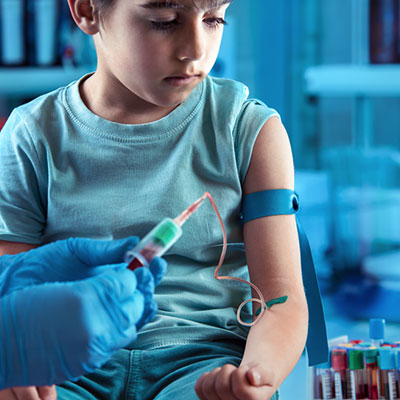Pediatric Hematology - Oncology
Pediatric Hematology:
Pediatric hematology is a specialized branch of medicine focused on diagnosing and treating blood disorders in children, from infancy through adolescence. It addresses a wide range of conditions, including anemia, hemophilia, sickle cell disease, thalassemia, leukemia, and other blood cancers, as well as clotting disorders and immune system abnormalities. Pediatric hematologists work closely with families to manage complex diseases that can affect growth, development, and quality of life, often involving intricate diagnostic tests, blood transfusions, and targeted therapies. Since children's blood systems are still developing, treatments must be carefully tailored to their unique physiological needs. Advances in pediatric hematology have significantly improved survival rates and quality of life for children with blood disorders, thanks to innovations in gene therapy, stem cell transplantation, and supportive care. This specialty also emphasizes early diagnosis, ongoing monitoring, and multidisciplinary collaboration to optimize outcomes and support the overall well-being of pediatric patients. Through research and clinical practice, pediatric hematology continues to evolve, offering hope and improved future prospects for children affected by blood-related conditions.
Commonly seen conditions:
- Nutritional anemia/Recurrant anemia
- Bone marrow failure
- Immune cytopenias
- Hemolytic anemia
- Thalassemia/Sickle cell anemia
- Genetic Immunity problems
- Hemophilia and other bleeding disorders
- Lymphoproloferative disorders
- Histiocytic disorders
- Leukemia
- MDS/Myeloproliferative disorders
- Hyperferritinemia syndromes
- Newborn Hematology
- Low platelets
- Anemia
- Bleeding disorders


Pediatric Oncology
Pediatric oncology is a specialized branch of medicine focused on diagnosing, treating, and researching cancers in children and adolescents. Unlike adult cancers, pediatric cancers often differ in their biological characteristics, treatment responses, and prognosis, necessitating tailored approaches. Common pediatric cancers include leukemia, brain and spinal cord tumors, lymphomas, neuroblastoma, Wilms tumor, and bone cancers like osteosarcoma and Ewing sarcoma. The field involves a multidisciplinary team comprising pediatric oncologists, surgeons, radiation oncologists, nurses, and supportive care specialists, all working together to develop personalized treatment plans. Advances in pediatric oncology have significantly improved survival rates over the past decades, owing to innovations such as targeted therapies, immunotherapies, and improved supportive care. Despite these advancements, challenges remain, including managing long-term side effects, secondary cancers, and providing psychosocial support to young patients and their families. Ongoing research aims to understand the genetic and molecular basis of childhood cancers better, improve early detection, and develop less toxic treatments, ultimately striving to enhance quality of life and survival outcomes for pediatric patients affected by cancer.
Commonly seen conditions:
- Leukemia - Blood cancer
- Lymphoma- Hodgkin/Non Hodgkin lymphoma
- Myelodysplastic syndrome Myeloproliferative disorders
- Renal tumors
- Liver tumors
- Neuroblastoma
- Germ cell tumors
- Soft tissue sarcomas
- Vascular malformations
- Bone tumors
- Brain tumors
- Endocrine tumors
